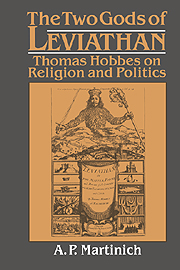Book contents
- Frontmatter
- Contents
- Acknowledgments
- A note on references
- Dedication
- INTRODUCTION
- PART I THE RELIGIOUS BACKGROUND TO HOBBES'S PHILOSOPHY
- PART II LAW, MORALITY, AND GOD
- PART III RELIGION WITHIN THE LIMITS OF SCIENCE AND POLITICS
- Chapter 7 GOD
- Chapter 8 REVELATION, PROPHETS, AND MIRACLES
- Chapter 9 ANGELS AND ESCHATOLOGY
- Chapter 10 THE CHURCH
- Chapter 11 SCRIPTURE
- Conclusion
- Appendix A Curley on Hobbes
- Appendix B Skinner on Hobbes
- Appendix C The frontispiece to Leviathan
- Notes
- Bibliography
- Index
- Frontmatter
- Contents
- Acknowledgments
- A note on references
- Dedication
- INTRODUCTION
- PART I THE RELIGIOUS BACKGROUND TO HOBBES'S PHILOSOPHY
- PART II LAW, MORALITY, AND GOD
- PART III RELIGION WITHIN THE LIMITS OF SCIENCE AND POLITICS
- Chapter 7 GOD
- Chapter 8 REVELATION, PROPHETS, AND MIRACLES
- Chapter 9 ANGELS AND ESCHATOLOGY
- Chapter 10 THE CHURCH
- Chapter 11 SCRIPTURE
- Conclusion
- Appendix A Curley on Hobbes
- Appendix B Skinner on Hobbes
- Appendix C The frontispiece to Leviathan
- Notes
- Bibliography
- Index
Summary
I argued in Chapters 3 and 4 that Hobbes uses the idea of God in his divine command theory of morality, and in Chapters 5 and 6 I asserted that he uses many theological concepts in his theory of politics. In this chapter, I want to discuss what Hobbes says about three related topics: human knowledge of God; the Trinity; and the relation between faith and reason.
THE LIMITS OF KNOWLEDGE OF GOD
It is important to distinguish among three claims:
(1) People have no idea of God.
(2) People have no knowledge of God's nature or essence.
(3) People have no knowledge of God.
Hobbes asserts propositions (1) and (2), but denies (3). Some medieval and early modern theologians asserted (1); most would have denied it, but largely because their criterion of having an idea of something was looser than Hobbes's. It is a matter of conjecture, but I think that if they accepted Hobbes's stringent condition on what counts as an idea of something, they too would have asserted it. Proposition (2) has been a standard claim within Christian theology from the Middle Ages to the present. Virtually all theologians denied (3). In short, Hobbes's position on the three propositions is quite in line with the tradition of Christian theology.
- Type
- Chapter
- Information
- The Two Gods of LeviathanThomas Hobbes on Religion and Politics, pp. 185 - 219Publisher: Cambridge University PressPrint publication year: 1992



